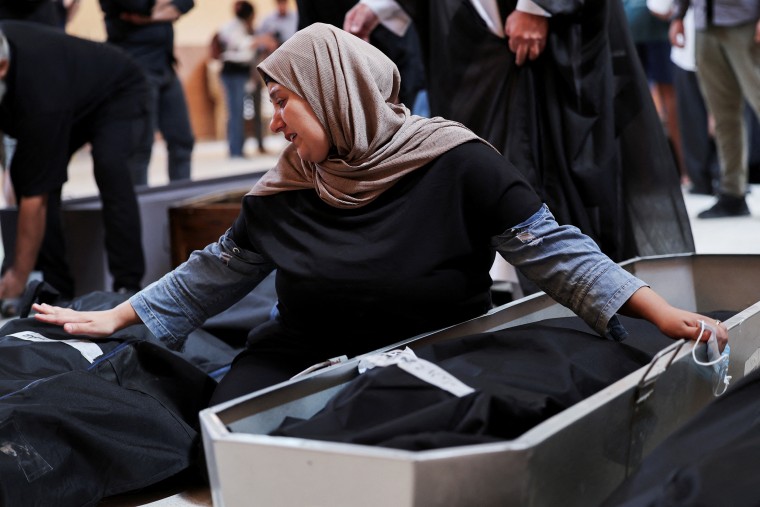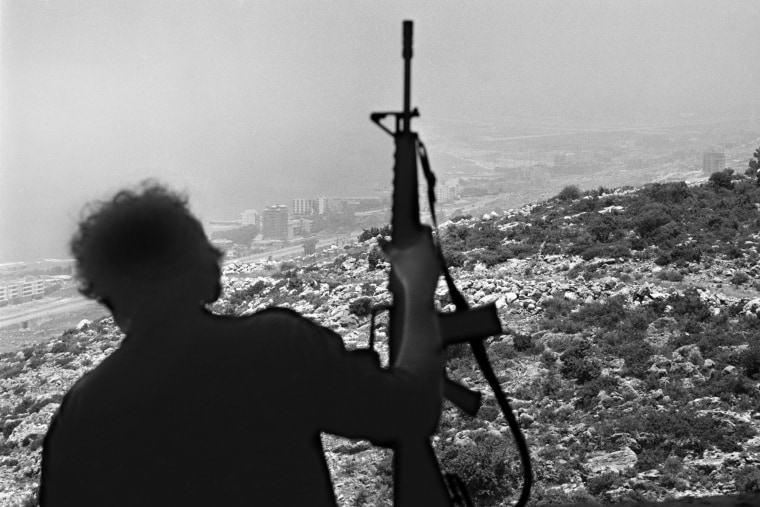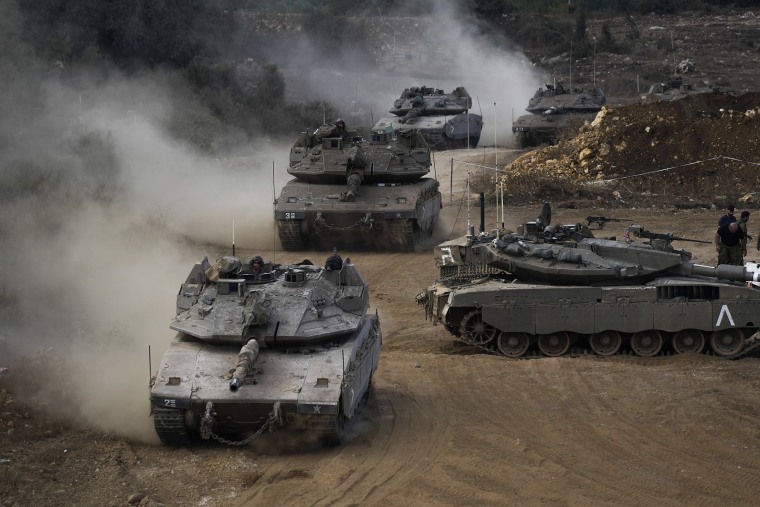ZOUK MOSBEH, Lebanon — Israel says its ground operation is limited. But its past invasions have many people in Lebanon, as well as wary Western officials and analysts, skeptical it will remain that way.
Haunted by past conflicts, this beleaguered country is now “facing one of the most dangerous stages in its history,” its prime minister said early Tuesday.
“We are scared,” Charbel, a 35-year-old man living in the Lebanese border town of Rmeish, told NBC News on Tuesday, hours after the Israeli military announced it had invaded southern Lebanon for what it called “limited, localized, and targeted ground raids” targeting Hezbollah.
Charbel, who asked that his last name be withheld because his organization had not given him permission to speak to the media, said he feared that Israel would inevitably expand its offensive.
“We don’t want to be displaced and suffer like the rest of the population,” he said, referring to the 1 million people officials estimate have fled weeks of Israel’s intense bombardment of its northern neighbor.

Hanging over all of this for Charbel — as well as the relatively small contingent of Israeli critics of the escalation with Hezbollah — is the fear that history will repeat itself. Israeli invasions in both 1982 and 2006 became more expansive and deadly than how they had been initially framed.
Those fears are not unfounded, Michael A. Horowitz, a geopolitical and security analyst who serves as the head of intelligence at Le Beck consultancy, told NBC News in an email Tuesday morning.
"These concerns are valid, because even if Israel seeks a limited operation, it can easily be pulled in even more, either due to military factors ... or political ones, if hawks within the government push to expand the goal of the operation," he said.
Fawaz A. Gerges, a professor of international relations at the London School of Economics, said he feared that Israel's military was "trying to soften Hezbollah's defenses" and probe its weak points with initial raids ahead of a potential larger incursion.
'Strategic failure'
Israel’s ground operation was met with a new wave of international concern and condemnation.
The United States expressed support for a limited Israeli operation, but a National Security Council spokesperson cautioned about the risk of “mission creep.” In fact, Israel was planning a larger invasion but decided to scale back after urging from Washington, an administration official and U.S. officials said. But the Biden administration remains concerned the mission could expand, the administration official said.
It has before.
In 1982, Israel invaded Lebanon while the country was in the grips of a civil war, marking the start of what would become a nearly two-decade occupation.
The offensive had initially targeted operatives with the Palestine Liberation Organization, which was formed in 1964 in the Egyptian capital, Cairo, shortly after the “Nakba,” which means “catastrophe” in Arabic and refers to the forced removal of an estimated 750,000 Palestinians from their homes in preparation for the founding of Israel in 1948. Many sought refuge in Lebanon.
Thousands of Israeli troops and tanks crossed the border, culminating in a deadly siege of the Lebanese capital, Beirut. A massacre in the city's Shatila refugee camp and the nearby Sabra neighborhood saw hundreds of Palestinians and some Lebanese nationals killed over the span of days by Israeli-backed Lebanese Christian militia commandos.

It was in the midst of this war that Hezbollah, the powerful militant and political group Israel is now battling, rose to prominence. Created with the support of Iran, the group was formed with a mission of expelling Israeli forces from Lebanon, while also resisting Western influence in the Middle East.
Israel retreated from Beirut in 1982, but continued to occupy the country's south until 2000.
"It was a strategic failure for Israel," Gerges said. "How many people know that Israel's 1982 invasion gave birth to Hezbollah?"
The years since have been marked by periods of heightened conflict between Israel and Hezbollah.
A 2006 war following Hezbollah's abduction of two Israeli soldiers saw more than 1,000 Lebanese, mostly civilians, and more than 150 Israelis, most of them soldiers, killed.
That 34-day war was brought to a halt by United Nations Security Council Resolution 1701, which called for both Israeli troops and Hezbollah to withdraw while the Lebanese army and U.N. peacekeepers would be the only armed forces south of Lebanon's Litani River.
The resolution was never fully implemented, however.
A ground operation now marks a significant escalation after nearly a year of cross-border exchanges between Israel and Hezbollah, although the head of the group's media office denied Tuesday that any Israeli troops had entered Lebanon.
Israel has emphasized that its actions remain limited, and an Israeli official said that the number of troops who crossed into southern Lebanon on Monday night was in “the low hundreds." But an NBC News crew driving across the country's north saw signs of a larger military build-up, including around a dozen tanks parked on the side of a highway, suggesting the operation could have the potential to expand.

Horowitz said this could reflect plans for a “phased approach” that would see “some of the IDF’s most experienced troops going in first, and other units coming second in greater numbers to protect engineering units in charge of clearing Hezbollah structure.”
Whether Israel will repeat its mistakes of the past in Lebanon remains to be seen.
“I do think Israel learned from prior mistakes both in 1982 and in 2006, mostly in the military sense, in the sense that it does rely far more on its intelligence capabilities, and on smaller scale and phased raids to attack,” Horowitz said.
But local officials say more than 1,000 people have already been killed in addition to the masses displaced in Lebanon since Israel ramped up its campaign weeks ago.
Jihan Kaisi, executive director of the Union of Relief and Development Associations, an organization helping displaced people across the country, said families sheltering in southern Lebanon were "traumatized" and terrified of what lies ahead.
"The families are scared," she said in a phone interview Tuesday morning, speaking from a shelter in the city of Saida, or Sidon. "They ran away from war and they found war here."
Zoya Awky reported from Zouk Mosbeh and Chantal Da Silva from London.
